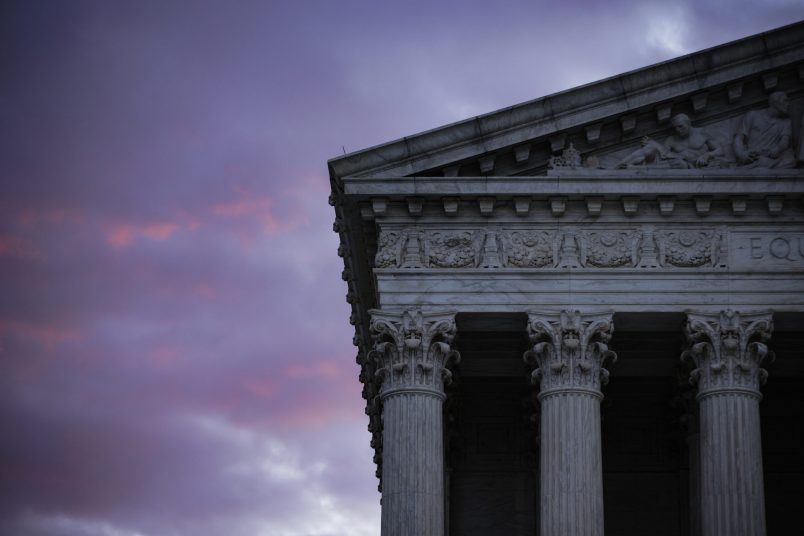To someone unfamiliar with the country’s recent redistricting history, Wednesday’s Supreme Court oral arguments must have sounded bizarre.
The justices and attorneys alike all candidly acknowledged that South Carolina legislators had manipulated their maps to artificially maximize Republican vote power and minimize Democrats’. They made no attempt to obfuscate that state Republicans were determined to pick their own voters, to rig elections until it became virtually impossible for their party to lose.
It’s a reflection of how grotesque redistricting cases have become ever since the conservatives on the Supreme Court, in 2019, decided that partisan gerrymandering cases were no longer justiciable in federal court. The only danger for South Carolina legislators, then, would come from the Supreme Court agreeing with the district judge panel that they’d used voters’ race — rather than party — to try to achieve that partisan end. It paints another layer of farce onto the case that, particularly in the South, race and partisan lean are often inextricably linked.
The right-wing justices, almost all of whom sounded firmly on the side of the South Carolina lawmakers, were dismissive of the plaintiffs’ case, which they said rested on circumstantial evidence.
“You’re trying to carry [your burden] without any direct evidence, with no alternative map, with no odd-shaped districts which we often get in gerrymandering cases and with a wealth of political data you’re suggesting your friends on other side would ignore in favor of racial data,” Chief Justice John Roberts said to the plaintiffs’ lawyer. “Have we ever had a case before where all it is is circumstantial evidence?”
Despite Roberts’ dismissal, the circumstantial evidence — which was enough for a panel of three federal judges to decide against the South Carolina lawmakers — is fairly compelling.
The state had to address uneven population distribution after the 2020 census: district one was too large, and district six too small. Rather than just shifting some district one surplus to district six, the legislators first shifted large swaths of Republican-leaning areas from district six into the overstuffed district one, only to then pluck out significant numbers of Black voters until district one’s Black voting age population fell back to 17 percent — the benchmark where the white Republican vote is enough to overcome it.
Justice Ketanji Brown Jackson, trying to convey the impossibility of the task for plaintiffs if such glaring reshuffling of Black voters isn’t enough, asked incredulously whether they’d needed a “smoking gun” to prove the case.
Much of the arguments broke down into granular quibbles over the credibility, or lack thereof, of the various experts who testified during the district court’s trial — even while the liberal justices consistently tried to remind their colleagues that all the Supreme Court is deciding is whether there was clear error by the district panel. That standard means that the appellate court must be deferential to the district court’s finding — even if it would have decided the case differently — as long as its conclusion is a plausible one in light of the record.
“The clear error standard — if that’s the standard that we are required to apply — is a very demanding standard,” Justice Samuel Alito said grudgingly. “But it is not an impossible standard. And it doesn’t mean that we simply rubber stamp findings by a district court.”
And, after Wednesday’s arguments, the Supreme Court seems unlikely to do so. If South Carolina triumphs on its central argument that it is all but impossible to prove that racial gerrymandering can be disentangled from partisan gerrymandering, it’ll again have swung close the federal courthouse doors to many cases trying to remedy these undemocratic exercises.
To date, greenlighting this distortion of democracy is one of the Roberts’ Court’s greatest legacies. It seems poised to add another notch to that post.







In a similar vein…
“Inside John Roberts’ Decades-Long Crusade Against the Voting Rights Act“
https://www.politico.com/magazine/story/2015/08/john-roberts-voting-rights-act-121222/
Chief Justice Roberts’ arguments all seem to boil down to the “Stephen Colbert” mantra: I don’t see race. People tell me I’m white, and I believe them because police officers call me “sir.”
If Rethugliklans can’t choose their voters they’ll never win any “elections.” Therefore the Rethugliklans on the SCOTUS must protect their fellow fascists’ “right” to select their own voters. Case closed.
Waiting for the “Nothing to see here BAU crowd” to tell us yet again how Roberts “holds the court together,” “cares about his legacy” and pushes the right wing fascists “to the center.”
We’ll all wait for you.
Not going to see a lot of those here.